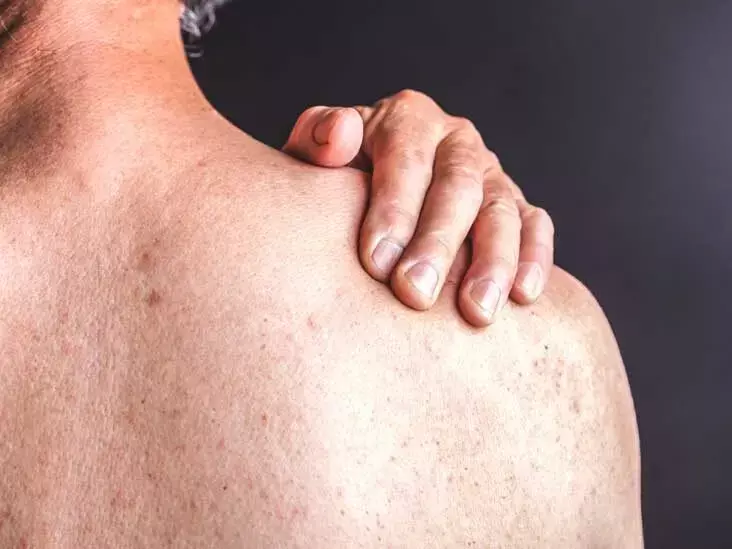- Home
- Medical news & Guidelines
- Anesthesiology
- Cardiology and CTVS
- Critical Care
- Dentistry
- Dermatology
- Diabetes and Endocrinology
- ENT
- Gastroenterology
- Medicine
- Nephrology
- Neurology
- Obstretics-Gynaecology
- Oncology
- Ophthalmology
- Orthopaedics
- Pediatrics-Neonatology
- Psychiatry
- Pulmonology
- Radiology
- Surgery
- Urology
- Laboratory Medicine
- Diet
- Nursing
- Paramedical
- Physiotherapy
- Health news
- Fact Check
- Bone Health Fact Check
- Brain Health Fact Check
- Cancer Related Fact Check
- Child Care Fact Check
- Dental and oral health fact check
- Diabetes and metabolic health fact check
- Diet and Nutrition Fact Check
- Eye and ENT Care Fact Check
- Fitness fact check
- Gut health fact check
- Heart health fact check
- Kidney health fact check
- Medical education fact check
- Men's health fact check
- Respiratory fact check
- Skin and hair care fact check
- Vaccine and Immunization fact check
- Women's health fact check
- AYUSH
- State News
- Andaman and Nicobar Islands
- Andhra Pradesh
- Arunachal Pradesh
- Assam
- Bihar
- Chandigarh
- Chattisgarh
- Dadra and Nagar Haveli
- Daman and Diu
- Delhi
- Goa
- Gujarat
- Haryana
- Himachal Pradesh
- Jammu & Kashmir
- Jharkhand
- Karnataka
- Kerala
- Ladakh
- Lakshadweep
- Madhya Pradesh
- Maharashtra
- Manipur
- Meghalaya
- Mizoram
- Nagaland
- Odisha
- Puducherry
- Punjab
- Rajasthan
- Sikkim
- Tamil Nadu
- Telangana
- Tripura
- Uttar Pradesh
- Uttrakhand
- West Bengal
- Medical Education
- Industry
Risankizumab effective in Moderate-to-Severe Plaque Psoriasis with favourable safety profile

Risankizumab demonstrated a favorable safety profile over short- and long-term treatment in patients with moderate-to-severe psoriasis.
Risankizumab demonstrated a favorable safety profile over short- and long-term treatment in patients with moderate-to-severe psoriasis in a study conducted by K.B. Gordon and colleagues.
The findings of this research were published in the British Journal of Dermatology on 15th October, 2021.
The goal of this study was to assess the safety of risankizumab psoriasis in phase 1–3 clinical trials. Short-term safety (up to week 16) was assessed using integrated data from five phase 2 and 3 clinical trials, while long-term safety was assessed using data from 17 phase 1–3 completed and ongoing trials.
The data for this integrated safety analysis came from 17 completed or ongoing clinical trials of risankizumab for moderate-to-severe psoriasis. The results showed that the event rates for adverse events (AEs) and AEs of safety interest were consistent with risankizumab's known safety profile, confirming its suitability for long-term use.
In this integrated analysis, the treatment-emergent mortality rate was 0.5 percent (16 deaths, 0.2 E/100 PY), with a standardized mortality ratio for treatment-emergent deaths of 0.32 (95 percent CI, 0.18– 0.53), indicating that the risk of mortality was not increased in risankizumab-treated patients when compared to the general population. The EAER of adjudicated MACE in this integrated analysis of risankizumab studies was low in both analysis sets (0.2 and 0.3 E/100 PY in the short- and long-term analysis sets, respectively), and compares favorably with the range in the PSOLAR study for other biologic therapies.
In conclusion, this comprehensive analysis of over 7000 PY of risankizumab exposure supports risankizumab's favorable safety profile in patients with moderate-to-severe psoriasis. Indeed, these findings do not point to any new potential risankizumab safety signals. These reassuring findings should help practitioners make long-term treatment decisions for their patients with moderate-to-severe psoriasis.
Reference:
Gordon, K. B., Lebwohl, M., Papp, K. A., Bachelez, H., Wu, J. J., Langley, R. G., Blauvelt, A., Kaplan, B., Shah, M., Zhao, Y., Sinvhal, R., & Reich, K. (2021). Long‐Term Safety of Risankizumab From 17 Clinical Trials in Patients With Moderate‐to‐Severe Plaque Psoriasis. In British Journal of Dermatology. Wiley. https://doi.org/10.1111/bjd.20818
Medical Dialogues consists of a team of passionate medical/scientific writers, led by doctors and healthcare researchers. Our team efforts to bring you updated and timely news about the important happenings of the medical and healthcare sector. Our editorial team can be reached at editorial@medicaldialogues.in.
Dr Kamal Kant Kohli-MBBS, DTCD- a chest specialist with more than 30 years of practice and a flair for writing clinical articles, Dr Kamal Kant Kohli joined Medical Dialogues as a Chief Editor of Medical News. Besides writing articles, as an editor, he proofreads and verifies all the medical content published on Medical Dialogues including those coming from journals, studies,medical conferences,guidelines etc. Email: drkohli@medicaldialogues.in. Contact no. 011-43720751


